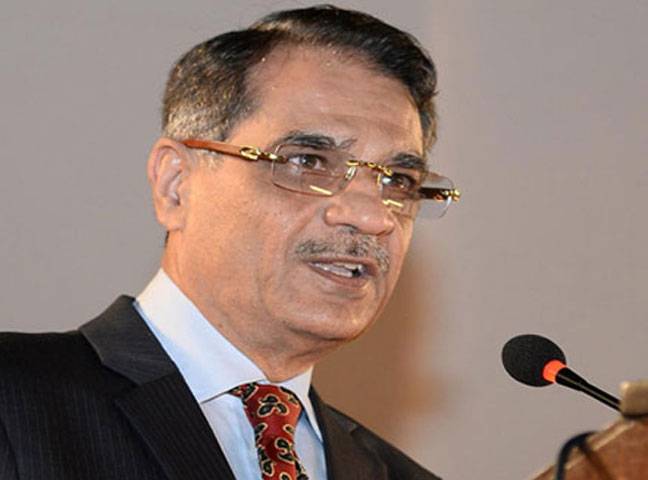ISLAMABAD - Chief Justice of Pakistan Mian Saqib Nisar on Tuesday observed that Shariah is the supreme law of the country.
While hearing the case of Tatheer Fatima seeking removal of her father's name in the documents, the CJP further observed that this court cannot overlook the Shariah in deciding the matter.
He made these observations when Tatheer's mother contended before the bench to consider her daughter's case from civic point of view instead of considering it within the purview of Shariah.
A three-judge bench headed by Chief Justice Mian Saqib Nisar and comprising Justice Mushir Alam and Justice Ijazul Ahsan resumed the hearing and hinted at referring the matter to executive.
Senior Advocate of Supreme Court Makhdoom Ali Khan argued before the top court that in order to eliminate the requirement of including father’s name in official documents of children, various amendments in statutory provisions and rules will be required.
He, however, submitted that there is no need for the name of father to be displayed on a person’s identification documents as long as such information is available in official records and databases of the authorities.
“On the other hand, if the requirement to display the father’s name on identification documents is removed, only the forms of identification prescribed under the rules will have to be modified.
This, in my opinion, would not be a cumbersome exercise for the relevant authorities,” Advocate Khan in capacity of amicus curie further submitted in his written submission.
The top court had appointed Advocate Khan as amicus curie in an appeal filed by 22 years Tatheer Fatima requesting the top court for issuing directives to mention the words ‘bint-e-Pakistan’ (the daughter of Pakistan) on the place of her father’s name in all her documents.
Tatheer Fatima claims that she was abandoned by her father who played no role in her life since birth.
She was raised by her mother as a single parent therefore she may be permitted to be registered as a citizen of Pakistan without her father’s name appearing in any official record or identification documents.
She further prayed for a direction to be issued to NADRA and Director General Immigration and Passports to issue the documents without her father’s name appearing on any such document.
Advocate Khan in his arguments stated that in the present age identification documents and databases are computerised while CNICs issued by NADRA contain microchips.
“Passports issued by DG, Passports are machine-readable. Persons are identified through thumb impressions, facial recognition technology and retina scans at all major airports in Pakistan and abroad.
In my opinion, therefore, there is no need for the name of father to be displayed on a person’s identification documents as long as such information is available in official records and databases of the authorities,” it stated.
Advocate Khan contended that there are many examples where identification documents do not display the information collected by the authorities.
He further stated that a form mentioning all the details has to be filled and submitted for a visa application by an applicant but it does not display on visa.
“This is so because as soon as the visa is scanned at the immigration desk, all information supplied by the person becomes available to the immigration officer.”
“In US, UK, Bangladesh, Sri Lanka, Malaysia, Canada, Kenya, United Arab Emirate (“UAE”) and many other countries the name of the father is not displayed on Passports of citizens.
In UAE, the name of the father is also not displayed on the driving license,” he added.
He further submitted that in Tatheer’s case the whereabouts of her father are known but it is Tatheer who does not want her father’s name to either appear in her official records or displayed on her identification documents.
He further contended that from an examination of the statutory provisions and rules it appears that the inclusion of a person’s father’s name in the official records is mandatory.
It also appears that the form of identification documents prescribed under the rules include displaying the father’s name (or husband’s name in case of married women) on such documents.
Arguing on the Interest of the state and fundamental rights of citizens, Advocate Khan submitted that seeking and collecting information for records is in the interest of the state.
On the other hand, he contended, it is the duty of the state that no violation takes place of guaranteed Fundamental Rights such as those of dignity and privacy, the right to life and the right to equality.
“This court, therefore, must find the balance between the public interest in the state seeking and collecting certain personal information and the right of the individual to insist that he/she has a right to insist that certain personal information not be displayed, disseminated, publicised or circulated,” he contended.
After the submissions of Advocate Khan, chief justice observed that the top court cannot direct for removal of Tatheer’s father name from her documents unless and until the amendments in the relevant law.
The bench directed the amicus curies in the case to prepare the terms and references for government’s perusal.
The bench observed that the solution of the issue needs to be written down after which the matter will be referred to the federal government.
The top court adjourned the hearing for a week.






